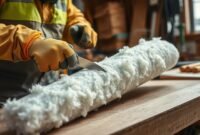Science has shown us that rubber, with its unique properties, is an excellent insulator for heat and electricity. This makes it an ideal material for various applications, from electrical wiring to insulation in living spaces.
Its effectiveness is comparable to other insulation materials like foam board insulation and batt insulation, providing a versatile solution for different insulation needs. But what is the real reason behind rubber insulating effectiveness? Why is rubber a good insulator?
Why Is Rubber A Good Insulator
Rubber is an excellent insulator because it effectively inhibits electrons from passing through it and accumulating energy, which would otherwise result in an electrical charge.
This property is particularly beneficial in environments where electrical safety is paramount, much like how rigid foam and foam board insulation are used to prevent energy loss through walls and ceilings, making it ideal for use in electrical mats in high-voltage areas.
Rubber absorbs electrons but cannot move quickly enough to gather the power necessary to disperse an electrical account.

Rubber serves as an excellent insulator, thanks to its high-quality composition, similar to how rigid foam insulation acts as a barrier in wall studs. It is commonly used to cover the outside of wires that conduct electricity, providing a safe and effective means to prevent electrical hazards.
A substance that inhibits or prevents the flow of an electrical current is known as an insulator. Rubber offers defense against the risks of electrical charges traveling via metal conductors.
Read also: What is Cellulose Insulation Made of?
Is Rubber A Good Insulator Of Electricity
Depending on a material’s electrical conductivity, it can also be classified as a conductor or insulator. Let’s examine the cause of rubber’s inability to carry electricity.
Rubber lacks electrical conductivity due to its ability to inhibit the movement of delocalized electrons inside it, much like foam board insulation, which prevents heat transfer through its structure. This property makes rubber ideal for insulating against electrical currents in various settings.
The valence shell electrons of rubber atoms do not have enough energy to shift into the conduction band under the effect of applied voltage. As a result, rubber behaves like an insulator.
Insulators are substances with a significant energy difference between the valence and conduction bands. Additionally, rubber is a strong insulator due to its low electrical conductivity.
Is Rubber A Good Insulator Of Cold?
Rubber is a flexible, naturally occurring substance with insulation qualities, making it valuable in various insulation applications. Its heat-insulating properties are akin to those of foam board insulation, which is used to maintain temperature control within living spaces. Let’s delve into why rubber acts as an effective heat insulator.
Rubber was isolating heat. Rubber is an insulator because it prevents heat from transferring from one location to another. In heat conduction, high-temperature molecules seek lower-temperature molecules to transfer heat. However, this does not occur in rubber.
In addition to the previously mentioned reason, rubber has extremely low thermal conductivity, ranging from 0.09 W/m K to 2.5 W/m K at ambient temperature. This aids rubber in maintaining its capacity to insulate heat.
Why Rubber Is A Good Insulator For Flooring Insulation
- Prevents Heat Loss
Rubber is rubber, a good insulator or a poor heat conductor. Rubber’s tightly bound electrons are unable to conduct heat because of this. Rubber has a high R-value, a word used to characterize heat resistance. Rubber surfaces prevent heat transfer, keeping spaces inside warm and comfortable.
For instance, tiled flooring or concrete surfaces lose heat more quickly than surfaces made of poured-in-place rubber. The high R-value of rubber prevents heat transfer through the thick cover.
- Creates a Vapor Barrier
In addition to ruining dwellings (due to problems like mildew), water vapor also negates the efficiency of your air sealing and insulation efforts. It may entirely throw off your utility budget. Thus, it is essential to manage the moisture in dwellings.
Rubber surface insulation slows heat transmission or flow and produces a vapor barrier. Water does not affect rubber. It prevents heat loss that would otherwise occur and stops moisture from entering your house. Rubber has this characteristic, which is particularly advantageous for homes with cold basements.
- Keeps the Home Cool in Summers
Rubber surfaces assist in maintaining a comfortable indoor temperature throughout the summer, avoiding heat loss, and keeping the interiors warm. Hot air does ascend, particularly through untreated floors.
Rubber flooring will thus avoid this situation if the temperature is high since it creates a barrier between the subfloor and the earth underneath you. Your home will stay cool and cozy as a result. Additionally, since your HVAC won’t have to work as hard, your power costs will be lower.
Bottom Line
The conclusion of “Why is rubber a good insulator?” is that the insulation in flooring is often forgotten when insulating a home. Unfortunately, the flooring is one of the holes that allow heat to escape from most US houses.
Installing flooring like poured-in-place rubber surfacing may do a lot to keep your interiors warm and comfortable by significantly reducing heat loss via floors. Rubber flooring is also resilient, comfortable underfoot, and simple to maintain.
That answers why rubber is a good insulator since these surfaces are skid-resistant and offer sufficient padding in case of a slip or a fall. They are suitable for households with dogs, children, and elders.


